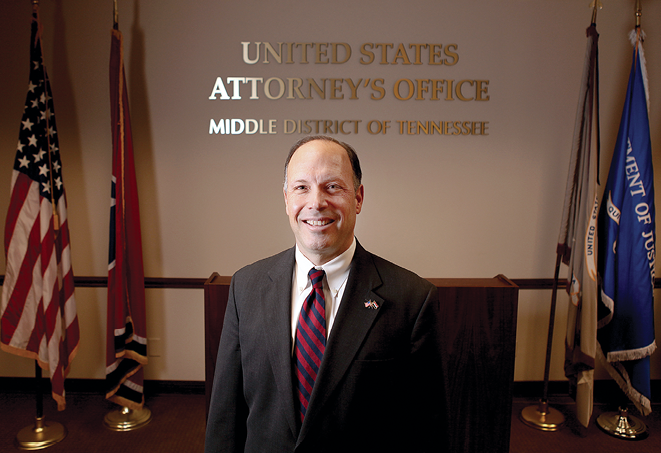Assistant U.S. Attorney Mark Wildasin ’91 volunteered to be “detailed” for a year to the U.S. Embassy in Iraq.

Mark Wildasin ’91 initially thought the Department of Justice’s insistence that he take a break every three months was excessive.
But after his first 15 weeks as an attorney-adviser to the Office of the Justice Attaché at the U.S. Embassy in Baghdad, Iraq, he found himself in full agreement with the policy. “That requirement made perfect sense,” he said. “I was walking along the street with my wife, Leta, while on leave, and I didn’t have to worry about a rocket attack or that the car next to me was going to explode. Working in Iraq was both the hardest thing I’ve ever done professionally and the most rewarding. I couldn’t have done it without my wife’s full support.”
Wildasin, an assistant U.S. attorney who is civil chief of the Middle Tennessee district, answered a DOJ call for volunteers for the one-year hazard post in Iraq in 2011. “I knew a number of people, including my son-in-law, who had served in the military in Iraq,” he said. “We were transitioning from a military-led operation to a civilian operation. I felt called to contribute to that transition.”
He had joined the DOJ in 2006 after 12 years in private litigation practice, first with Coudert Brothers in San Francisco and then with Waller Lansden Dortch & Davis in Nashville. At both firms, he specialized in intellectual property and corporate litigation. Wildasin’s move to the U.S. Attorney’s office was not his first stint in public service; he had clerked for federal Judge Thomas A. Higgins of the Middle District of Tennessee after law school.
In Iraq, Wildasin’s work differed considerably from his caseload for the Middle District of Tennessee, where he leads a team that prosecutes fraud and represents the federal government in an array of civil matters. In addition to helping Iraqi judges investigate and prosecute alleged terrorists, Wildasin played a role in helping Iraq achieve and enforce the rule of law. That proved to be an ongoing challenge, although the country has a well-established civil law system based on the Napoleonic code. “They have very good and experienced judges,” Wildasin said. “But the average Iraqi is still struggling with a lack of basic services—electricity, water, sewer, garbage, fuel—and that makes everything challenging.”
Wildasin also supported an effort to finalize laws against human trafficking based on the model United Nations human trafficking law. “I spent a lot of time working with the local police, teaching them to approach children arrested for begging or prostitution as victims of trafficking rather than as criminals,” he said. He also helped a group of laborers from an Eastern Bloc country whose employer had abandoned them, marooning them in the country with no papers or money. “They were squatting in a half-finished building in 120-degree heat,” Wildasin said.
Political instability in neighboring countries and their interest in having influence in Iraq compound the dangers of everyday life. Wildasin lived in the American embassy inside a heavily guarded walled compound known as the Green Zone. “When we traveled to the Red Zone, we were in armored convoys, and we wore helmets and flak jackets,” he said. “It’s different to go to a meeting when you show up in an armored car with 15 of your heavily armed friends. But when you get there, you’re a lawyer, so you take your flak jacket off and get to work. I had a lot of faith in our security. If they decided a meeting was over for whatever reason, we left, and if they decided a meeting was off, we didn’t go.”
Wildasin resumed his work for the Middle District of Tennessee last October. Looking back on his stressful year in Iraq, he derives a great deal of personal satisfaction from his contributions, but remains concerned about Iraq’s future. “Judges in Iraq work as investigators and prosecutors,” he said. “I worked with judges in the central criminal court who were investigating terrorists. They are subject to assassination and attacks, and they don’t live behind protective walls and razor wire. They are extremely brave, as are all the Iraqis who work with us.”